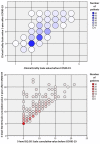Long-Term Effects of Hospitalization for COVID-19 on Frailty and Quality of Life in Older Adults ≥80 Years
- PMID: 36233655
- PMCID: PMC9573757
- DOI: 10.3390/jcm11195787
Long-Term Effects of Hospitalization for COVID-19 on Frailty and Quality of Life in Older Adults ≥80 Years
Abstract
Objectives: This study aimed to assess the effects of frailty and the perceived quality of life (QOL) on the long-term survival (at least 1 year) of patients ≥ 80 years hospitalized for COVID-19 and the predictors of frailty and QOL deterioration in survivors. Design: This is a single-center, prospective observational cohort study. Setting and Participants: The study was conducted in a teaching hospital and enrolled all COVID-19 patients ≥80 years old consecutively hospitalized between April 2020 and March 2021. Methods: Clinical variables assessed in the Emergency Department (ED), and during hospitalization, were evaluated for association with all-cause death at a follow-up. Frailty was assessed by the clinical frailty scale (CFS), and the QOL was assessed by the five-level EuroQol EQ-5d tool. Multivariate Cox regression analyses and logistic regression analyses were used to identify independent factors for poor outcomes. Results: A total of 368 patients aged ≥80 years survived the index hospitalization (age 85 years [interquartile range 82-89]; males 163 (44.3%)). Compared to non-frail patients (CFS 1-3), patients with CFS 4-6 and patients with CFS 7-9 had an increased risk of death (hazard ratio 6.75 [1.51, 30.2] and HR 3.55 [2.20, 5.78], respectively). In patients alive at the 1-year follow-up, the baseline QOL was an independent predictor of an increase in frailty (OR 1.12 [1.01, 1.24]). Male sex was associated with lower odds of QOL worsening (OR 0.61 [0.35, 1.07]). Conclusions and Implications: In older adults ≥80 years hospitalized for COVID-19, the frailty assessment by the CFS could effectively stratify the risk of long-term death after discharge. In survivors, the hospitalization could produce a long-term worsening in frailty, particularly in patients with a pre-existing reduced baseline QOL. A long-term reduction in the perceived QOL is frequent in ≥80 survivors, and the effect appears more pronounced in female patients.
Keywords: 5L-EQ-5D; COVID-19; age ≥80 years; clinical frailty scale; older adults.
Conflict of interest statement
The authors declare no conflict of interest.
Figures


References
-
- WHO Coronavirus (COVID-19) Dashboard—WHO Coronavirus (COVID-19) Dashboard with Vaccination Data. [(accessed on 30 May 2022)]. Available online: https://covid19.who.int/
-
- Ministero Della Salute. [(accessed on 30 May 2022)]; Available online: https://www.salute.gov.it/portale/home.html.
LinkOut - more resources
Full Text Sources
Miscellaneous

